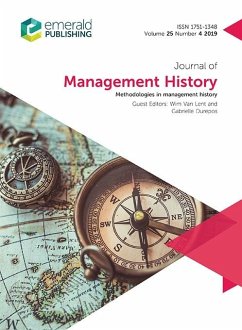Ever since Booth and Rowlinson (2006) proposed a "e;historic turn"e; in management and organization studies (MOS), scholars have increasingly recognized the importance of history to understanding organizational life (e.g., Durepos and Mills, 2012; Rowlinson, Hassard and Decker, 2014; Bucheli and Wadhwani, 2014; Suddaby, 2016). Indeed, the historical discipline provides an alternative to the dominant science paradigms in organization studies (Zald, 1993; Kieser, 1994), so studies using a historical approach have the potential to inform various aspects of organization theory (Alvaro-Moya and Donze, 2016; Soederlund and Lenfle, 2013; Suddaby, 2016; Maclean, Harvey and Clegg, 2016).
Dieser Download kann aus rechtlichen Gründen nur mit Rechnungsadresse in A, B, BG, CY, CZ, D, DK, EW, E, FIN, F, GR, HR, H, IRL, I, LT, L, LR, M, NL, PL, P, R, S, SLO, SK ausgeliefert werden.









